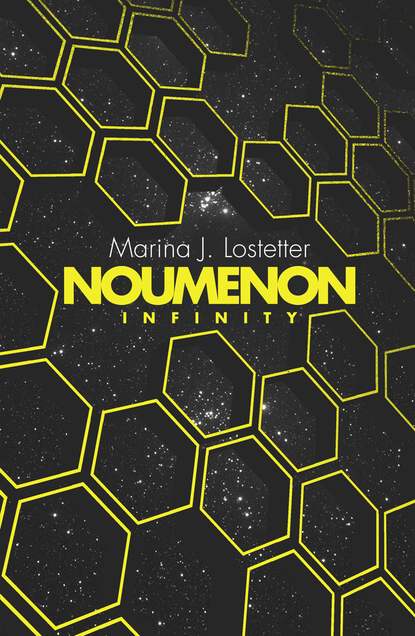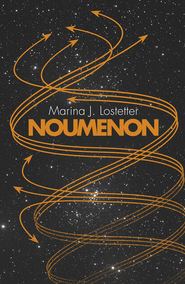По всем вопросам обращайтесь на: info@litportal.ru
(©) 2003-2024.
✖
Noumenon Infinity
Настройки чтения
Размер шрифта
Высота строк
Поля
“I can’t, but you can. How did you sell this mission? Do you remember your pitch? Because I do. You told the consortium that these missions needed better PR, that they could fade into the night if the public isn’t constantly reinvigorated. How invigorated do you think they’re going to be when you announce that we—we—had to take drastic measures to get here? This is scandal on top of scandal, inviting that much more scrutiny. Why shouldn’t they halt the missions in their tracks, put everything on pause until they can be sure it’s not fraud all the way down?
“Because you know they’d have to launch a full-scale, public investigation for the sake of saving face. I know the value of a power play. I know how to get done what needs doing. But god help anyone in the public eye doing what needs doing. All the public cares about are feelings, about getting along—”
“They care about ethics, you moron. Without ethics, there can be no real business, no real trade, because those things rely on equal footing. When it’s not trade anymore, it’s coercion. It’s stepping on necks and breaking backs. It crushes ideas, it stops advancements, it does the very opposite of what we—you and I specifically—are trying to accomplish here. It means merits don’t matter because whoever can be the biggest sleazeball wins.”
“What a beautiful world you must live in, all rose-colored and—”
“Don’t patronize me!”
A light knock on the door made both of them spin. It opened a crack, revealing a base guard. “Is everything all right in here?”
She almost said no. She was a hair’s breadth away from demanding Kaufman be removed from her sight.
But she wasn’t done with him.
“Fine,” they both barked.
Blanching, the guard closed the door.
“You’re going to upset the public. And they wouldn’t be wrong to be angry.”
“They should be angry,” she said.
“But does that give them the right to destroy what almost every nation in the world has contributed to? They don’t have to destroy it consciously, mind you. Their lack of attention, their turning away, will do more to dismantle everything than attacking a convoy ship to take it apart at the rivets.
“And let’s be clear, Vanhi. If you go out there and explain what happened, you will not be clear of blame. Your career will go down the drain for sure, and they might flat-out cancel this convoy as well, which means that many more hours will have been wasted, that much more money. The consortium may not find it in their hearts—or pocketbooks—to reassign a new mission. People will further question why we’re doing this. Doing any of it. People will feel cheated, angry. You know what happens when people get angry? Bye-bye peace. This world peace we’ve been able to hold on to since you were a child. You don’t know any different, but I do. You don’t remember the constant wars and skirmishes. You don’t remember drafts and widespread domestic terrorism. You’re not afraid of it because you never experienced it.”
“The world is not going to fall into chaos because of one—”
“It might,” he insisted. “There has to be a first domino somewhere. This could be that domino, and you are the finger. All you need to do is flick over this first indiscretion and watch the others reveal themselves. Watch them spiral.”
“But it’s your finger! You’re not putting this on me. I will not feel guilty for what you did.”
“Good, and you shouldn’t. But if you go through with your self-righteous reveal, that you will have to live with. Your choice. Let one injustice stand for the betterment of all humanity. Or topple over that domino and see how much ruin falls in its wake.”
Their eyes locked. Vanhi stared at him, fury constricting her lungs and her throat. How dare he put her here? This was a false choice. An illusion of choice. How dare he? How … how?
Another knock at the door.
“What?” Vanhi called.
The guard peeked in again. “Doctor Kapoor, Kaufman. It’s time.”
Swallowing dryly, fighting to control the rage contorting her expression, she adjusted her glasses and smoothed her jacket, trying to reset. Trying to remain calm. “I don’t want you up there with me,” she said to Kaufman, averting her gaze. “I don’t want you on the stage, I don’t want you in the audience, and I expect you to resign all further involvement in this project.”
“What do you plan to say?” he demanded.
She ignored the question. “Do you understand me?”
“Yes. But what are you going to say?” It wasn’t pleading—there wasn’t a hint of desperation. He simply wanted to know, to feel in control.
Without another word, she followed the guard out, slamming the greenroom door behind her.
As she took the stage and positioned herself behind the podium, ignoring the bright blue planet behind her, his question echoed in her mind, but in her own voice instead of his. What are you going to say?
What am I going to say?
The lighting in the conservatorium was nothing like the lighting in your typical auditorium. There were no harsh lights beating down on her in the midst of a darkened room—no glare to hide the audience’s faces. Every eager reporter’s eyes were clear as day, tracking her movements, softening at her smile.
You have to do it, she told herself. You have an ethical obligation. You owe Dr. Chappell her life back.
But …
And that was it, a little worming thought. But.
But what if he was right?
Worse yet, what if she had been right, back when she’d poured her heart out in front of the consortium chair? The missions lived and died by public opinion. They might not get canceled, but they would lose their life spark.
She couldn’t watch the current climate of scientific enthusiasm crumble because of one man’s arrogance. She didn’t want to see the light go out in a colleague’s eyes when she came into a room. She didn’t want little kids taking spaceship stickers off their walls. She didn’t want history books to have horrible footnotes describing how the first interstellar missions had been tainted by backstabbing and positioning.
… Didn’t want the media hounding her ma and papa.
With one admission, there was so much that could go wrong.
The vines entwined with her bones squeezed and pulled taut, powdering her resolve like so much chalk.
So, he wins, she said to herself. He wins, but only so that everyone else on the entire planet doesn’t lose.
The plant inside her—having done its job—wilted and died.
She hated him. She hated herself. She hated that she would never be free of this—helping him destroy what could have been the greatest scientific mission to date in order to advance what she personally thought was important.
She wanted to shrivel into dust and blow away in the wind, just like that plant.
Instead, she cleared her throat, widened her smile, and welcomed everyone to this joyous occasion.
APRIL 22, 2126 CE
“So, how’s it been with all the visitors? You give many tours?” Swara asked, hands in her pockets, duffel bag hoisted over one shoulder. Vanhi and her sister strolled lazily down the hall, en route to the docking bay. “And you’ve got to tell me something, be honest. Does artificial gravity feel funny to you?”
“The visitors are fine,” Vanhi assured her. “We’ve got liaisons for that. Tour guides. They’re great, actually. Sometimes I think they know more about the ships than I do. And the gravity … I think that’s just you.”
“Really, you don’t feel lighter up here?”
“Gravitons are gravitons are gravitons. We’re harnessing them, not mimicking them. Trust me, the gravity here feels exactly the same as Earth-side. If it didn’t, we’d have a big problem.”
“Oh, because that would mess with the experiments?”
Другие электронные книги автора Marina J. Lostetter
Noumenon




 0
0






